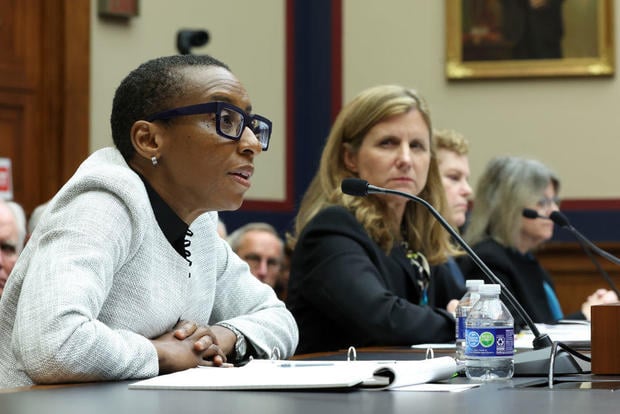College presidents face tough questions from Congress over antisemitism on campus

WASHINTON (CBS) — Three college presidents testified before a House committee on Tuesday about how they have handled antisemitic incidents on their campuses since the Oct. 7 terrorist attack by Hamas on Israel, with many Republican lawmakers insisting they aren’t doing enough to root out and denounce anti-Jewish sentiments.
Harvard University’s Claudine Gay, the University of Pennsylvania’s Liz Magill and the Massachusetts Institute of Technology’s Sally Kornbluth appeared before the House Committee on Education and the Workforce to explain and defend their approaches. College campuses continue to be roiled by protests and tensions related to the Israel-Hamas war.
Republicans, including House GOP Conference Chair Elise Stefanik, questioned why the administrators haven’t yet punished students or eliminated student groups using hateful and violent language against Jews. The presidents expressed that they disdain antisemitic language but also value free speech.
A number of reported antisemitic incidents have prompted accusations that universities are not doing enough to protect students. The Department of Education’s Office for Civil Rights is investigating Harvard and the University of Pennsylvania, among other schools, after receiving alleged complaints of antisemitism and Islamophobia. Harvard, the University of Pennsylvania and MIT are private institutions but receive millions of dollars in federal funding, making them subject to federal anti-discrimination laws.
In one of the more tense exchanges during the hearing, Stefanik pressed Gay on some Harvard students’ chants of “intifada,” a reference to Palestinian uprisings in Gaza and the West Bank against Israel. Gay said that “type of hateful speech is personally abhorrent to me” and “at odds with the values of Harvard.”
Still, Gay said, “We embrace a commitment to free expression, and give a wide berth to free expression, even of views that are objectionable, outrageous and offensive.” Stefanik later asked Gay if “calling for the genocide of Jews” constitutes bullying and harassment, according to Harvard’s rules. Gay said the language is “antisemitic,” but did not say it necessarily constitutes bullying and harassment.
“When speech crosses into conduct, we take action,” Gay said.
Rep. Virginia Foxx of North Carolina, the committee’s Republican chairwoman, said administrators “have largely stood by, allowing horrific rhetoric to fester and grow” amid “countless examples of antisemitic demonstrations on college campuses.”
“After the events of the past two months, it’s clear that rabid antisemitism and the university are two ideas that cannot be cleaved from one another,” Foxx said, insisting that “institutional antisemitism and hate are among the poison fruits of your institutions’ cultures.”
Foxx asked each individual president if Israel has the right to exist as a Jewish nation, and all three college presidents agreed that Israel does.
There has also been an increase in the number of Islamophobic incidents around the country, something Rep. Bobby Scott, the top Democrat on the committee, and the witnesses mentioned.
“Historically, college campuses have been hubs for students and faculty to foster intellectual thought and expression,” Scott said in his opening remarks. “Regrettably, following Hamas’ Oct. 7 attack on innocent civilians in Israel, the ongoing conflict in Gaza, college campuses have become polarized, and we’ve been witnessing a disturbing rise in incidents of antisemitism and Islamophobia.”
After the Hamas terrorist attack, a number of student organizations at Harvard released a statement blaming Israel for the bloodshed, drawing backlash from prominent alumni and U.S. lawmakers. Harvard leaders were then criticized for being too slow to condemn the student organizations and not doing so more forcefully. On Tuesday, Gay recognized the rise of antisemitism across the country and on her own campus, as well as a rise in Islamophobia.
“During these difficult days, I have felt the bonds of our community strained,” Gay said. “In response, I have sought to confront hate, while preserving free expression. This is difficult work. And I know that I have not always gotten it right. The free exchange of ideas is the foundation upon which Harvard is built, and safety and well being are the prerequisites for engagement in our community.”
A number of antisemitic incidents have also been reported at the University of Pennsylvania, including “vile” messages that were projected onto campus buildings and “disturbing” emails that threatened violence against members of the campus’ Jewish community. The FBI was alerted to the threats, according to the school’s president.
MIT has suspended a number of students from nonacademic activities after protesters refused to leave a campus building, bringing criticism that the punishment did not go far enough. Jewish students have said they feared for their safety and were physically blocked from attending classes.
“As an American, as a Jew, and as a human being, I abhor antisemitism, and my administration is combatting it actively,” MIT’s Kornbluth testified Tuesday.
Pamela Nadell, a professor of Jewish history at American University and the fourth witness at the hearing, testified that the “antisemitism igniting on campuses today is not new,” but rather “part of a long history of American antisemitism.”




